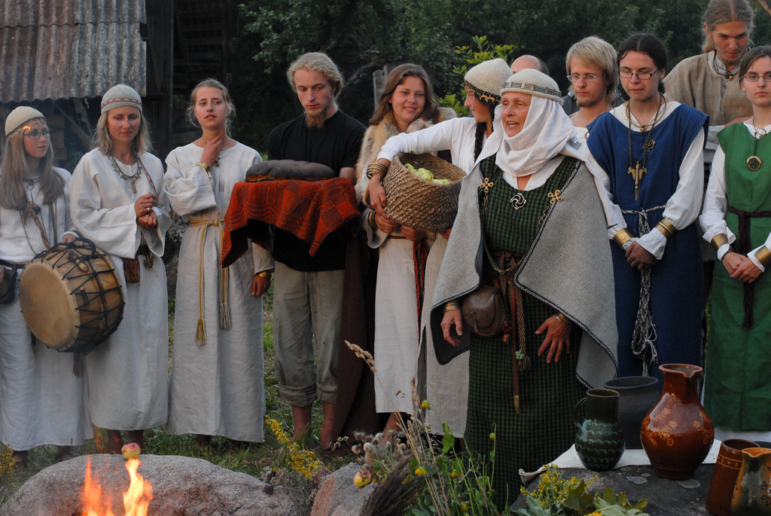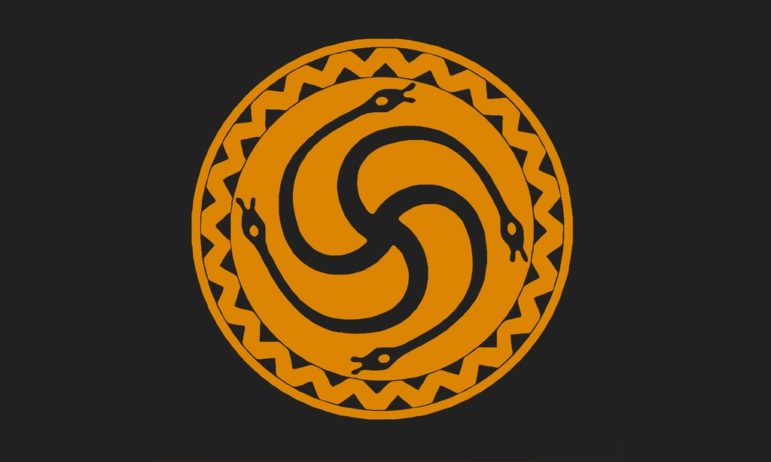VILNIUS, Lithuania – On Thursday, after years of effort and a European Court of Human Rights (ECHR) decision, Lithuania’s parliament, the Seimas, granted state recognition to Romuva, a religious association reviving the ancient Baltic pagan faith.

Participants in a Romuva ceremony [Mantas LT, Wikimedia Commons, CC 2.0]
Romuva is a modern reconstruction of the spiritual traditions, deities, and practices that predated Lithuania’s conversion to Christianity in the 14th century. Its name honors the Romuva sanctuary, a central spiritual site of the Baltic peoples described in historical sources as a place where an eternal fire spread peace throughout the region. According to recent data, over 5,000 Lithuanians identify with the Romuva faith.
The motion passed with 64 votes in favor, eight against, and 10 abstentions. “In Lithuania, people of different nationalities and religions have coexisted for a long time,” said Social Democrat MP Jūratė Zailskienė, “and everyone has been able to practice what they want, I invite you to support this motion and finally resolve the Romuva issue.”
This victory marks the culmination of a decades-long struggle for recognition. The Romuva movement began in 1967, but was suppressed by the Soviets in the 1970s. When the Soviet Union’s power waned in the late 1980s, adherents began to practice openly, and in 1995, after Lithuanian independence, Romuva was recognized as a “non-traditional” registered religious organization – the first of three levels of religious recognition found in the Lithuanian system.
Lithuania’s system has three tiers: registered religious organizations (Level 1), which grants basic legal status for property ownership and fundraising; state-recognized religions (Level 2), which include benefits such as tax exemptions, social insurance for clergy, and automatic recognition of religious marriages; and traditional religions (Level 3), which receive state funding and are defined by a 1995 law as part of Lithuania’s historical and cultural heritage. Only nine groups hold traditional status, including Roman Catholics, Greek Catholics, Evangelical Lutherans, and Sunni Muslims.
Despite meeting legal requirements, Romuva faced significant opposition in achieving Level 2 status, particularly from the Catholic Church. In 2019, Archbishop Gintaras Grušas, chairman of the Lithuanian Bishops’ Conference, criticized Romuva’s historical authenticity and questioned the coherence of its teachings.
The Seimas rejected Romuva’s applications for state recognition multiple times. In 2021, the ECHR ruled that Lithuania’s earlier refusals violated the principles of religious freedom. The court found the decisions were influenced by political and personal religious beliefs rather than objective criteria. The ruling raised concerns about the impartiality of Lithuanian authorities and underscored systemic biases against non-Christian religious groups. In 2022, despite the ECHR ruling, the Seimas – at the time controlled by a coalition of socially conservative parties – again rejected Romuva’s bid for recognition.
Control of the Seimas changed hands in October, bringing a coalition under the Social Democratic Party into power and opening up the opportunity for a different result for Romuva. With Thursday’s vote, Lithuania now officially recognizes Romuva as a state-recognized, Level 2, religious organization.
Romuva’s recognition as a Level 2 religion entitles it to several legal benefits, including functioning as a charity; receiving tax exemptions on property and access to national broadcasting for religious services; and legal recognition of marriages performed by its priests.
Despite this progress, achieving Level 3 status will pose significant challenges. The 1995 law does not outline procedures for adding religions to the “traditional” list, which critics argue unfairly limits the recognition of newer or revived faiths. Romuva, which considers itself a continuation of pre-Christian Baltic traditions, contends that it represents Lithuania’s cultural and spiritual heritage and is therefore a traditional religion. However, its critics, including some academic experts, argue that the modern Romuva movement, established in the late 20th century, cannot be definitively linked to the ancient religion.
In Letters from Hardscrabble Creek, a Pagan Studies blog by Chas S. Clifton, Scott Simpson, lecturer at Jagiellonian University in Poland and co-editor of Modern Pagan and Native Faith Movements in Central and Eastern Europe, commented on the milestone.
“What has happened is that the religious organization of Romuva, in keeping with Lithuanian law in spite of some hard-to-forgive discriminatory delay, has moved from being in the first tier (a ‘registered’ religious organization) to being in the second tier (a ‘state-recognized’ religious organization).”
However, he noted that attaining Level 3 status would involve murkier criteria and greater challenges in proving the continuity of Romuva’s ancient roots. “Romuva firmly believe they should be recognized as continuing the ancient tradition… but making a play for Level 3 will face much murkier criteria.”

Romuva Flag – Image credit: DiegoAma – WikiCommons
Amid the legal and bureaucratic hurdles, Romuva’s leaders and members celebrated the hard-earned victory.
“Congratulations, dear Roma and Lithuanians!” Inija Trinkūnienė, a long-time leader of the movement, said on social media. “Seven years of legal and bureaucratic battles ended in our victory. Seven years is not one day! We are all happy that the Ancient Baltic Religious Community ‘Romuva’ was recognized by the Seimas! We are so happy and celebrating Romuva’s birthday! Thank you to those who supported and voted, and thank you for continuing the traditions of our ancestors!”
This recognition not only secures legal rights for Romuva but also marks an important step in Lithuania’s evolving approach to religious diversity, challenging the dominance of historical religious hierarchies and fostering greater acceptance of spiritual pluralism.
Editor’s note: The editorial team at The Wild Hunt wishes to offer its personal congratulations to Romuva on this historic achievement. This victory is a testament to the perseverance of your organization in the face of enormous opposition, and should be an inspiration to all organized Pagan groups around the world.
The Wild Hunt is not responsible for links to external content.
To join a conversation on this post:
Visit our The Wild Hunt subreddit! Point your favorite browser to https://www.reddit.com/r/The_Wild_Hunt_News/, then click “JOIN”. Make sure to click the bell, too, to be notified of new articles posted to our subreddit.